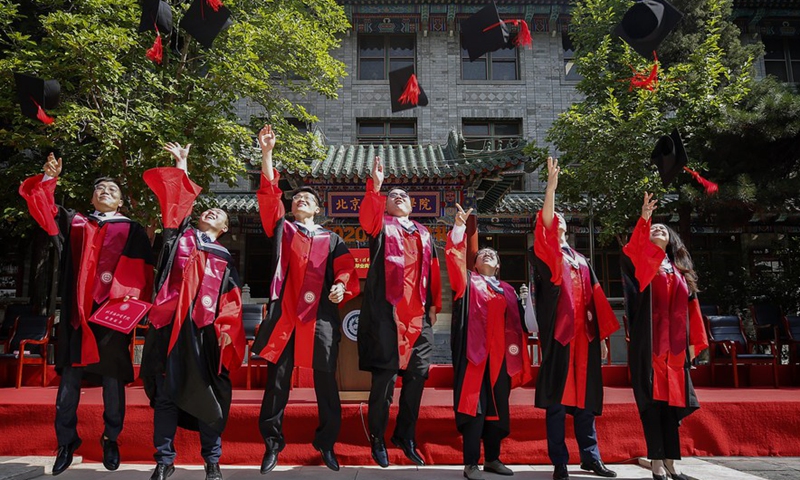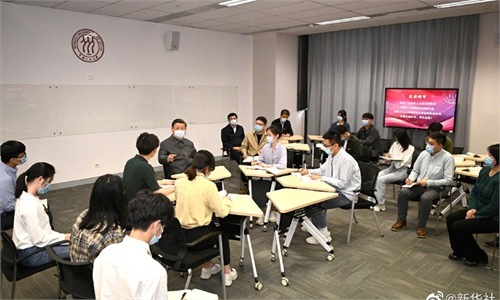Talent cultivation on 'new path with Chinese characteristics' as nation establishes world's largest higher education system
Exiting intl uni rankings shows 'courage, independent development spirits'

Graduates celebrate their graduation after the commencement ceremony of the Peking Union Medical College in Beijing, capital of China, June 30, 2020. (Xinhua/Zhang Yuwei)
As the Ministry of Education (MOE) announced on Tuesday that China has established the world's largest higher education system with 240 million college graduates, top-ranking Tsinghua University's vice president said the country's higher education sector is on a new path of high-quality development with Chinese characteristics while constantly taking the initiative to cultivate high-level innovative talent.Xie Weihe, vice president of Tsinghua University, speaking at a press conference on Tuesday, also stressed that today, China's overall strength and quality of higher education have reached their best levels in history.
At the press conference, the MOE introduced the achievements of China's higher education reform and development since the 18th Communist Party of China National Congress in 2012, noting that the total number of students in higher education at present is more than 44.3 million.
The enrollment rate in higher education increased from 30 percent in 2012 to 57.8 percent in 2021, a historic leap showing that higher education in China has entered the popularization stage that's recognized by the world, the ministry said.
Over the past decade, more than 10,000 outstanding students have chosen basic disciplines, paving the way for independent talent cultivation, and the establishment of a solid foundation for building the world's most important source of talent and innovation hubs.
Since the 18th CPC National Congress, a total of 265 new majors have been included in the undergraduate program catalog. As a result, 17,000 new undergraduate programs were added, and talent training became more adaptable to new technologies, industries and forms of business.
The Ministry of Education, relevant ministries and commissions, large enterprises and local governments have jointly built 151 new colleges and universities.
Also, the capacity of colleges and universities to serve major national strategies has continued to increase. The colleges and universities have undertaken more than 60 percent of the national basic research tasks and more than 80 percent of the national natural science foundation projects.
For example, they have provided key technology for high-speed rail systems, nuclear power, biological breeding, vaccine development, national defense and other key areas, and they actively participated in the development of super computers, the BeiDou Navigation Satellite System and the Shenzhou spacecraft series.
To better cultivate talent independently and better serve the national strategies, Renmin University of China in Beijing, one of the top universities in the country, has stopped participating in all international university rankings, which has drew wide attention recently.
Leaders of the university had reached a consensus on the decision, saying it follows the education development trend in China, China National Radio (CNR) cited an insider as saying on May 9.
"Renmin University of China exiting international rankings reflects the strong courage of Chinese universities, Chinese education, and Chinese culture to hold onto independent development," said the insider.
"We hope to develop Chinese cultural traditions in an innovative way, create China's independent knowledge system, and safeguard China's education and cultural sovereignty," CNR reported, citing an official from Renmin University of China.
Also, Nanjing University in East China's Jiangsu Province and Lanzhou University in Northwest China's Gansu Province have also withdrawn from international university rankings.
Nanjing University made it clear in its 14th Five-Year Plan Formulation that the university would not take improving international rankings as an important development goal.
Many colleges in China have focused too much on these so-called international rankings, which made them utilitarian in education, thus going far from the original spirit of imparting knowledge and educating people, and not beneficial in carrying out scientific research that serves the people and country, Xiong Bingqi, deputy director of the Shanghai-based 21st Century Education Research Institute, told the Global Times on Tuesday.
Exiting the international university rankings does not mean quitting international education exchanges, the education expert explained.
While happily to see that China has established the world's largest higher education system, Xiong said there is still a long way to go to achieve higher education of world-class quality.
There are at least two criteria for a first-class school - to cultivate world-class talent and to gain original scientific research or academic research results that affect the world, Xiong said, noting that there are still many bottleneck problems that need to be solved.
Xiong warned that the blind pursuit of large-scale and high-volume higher education could lead to serious involution of academic qualifications, which could cultivate examination-oriented students, not high-quality innovative talent.
It is time for China to pursue a higher education system with higher quality, he said.




